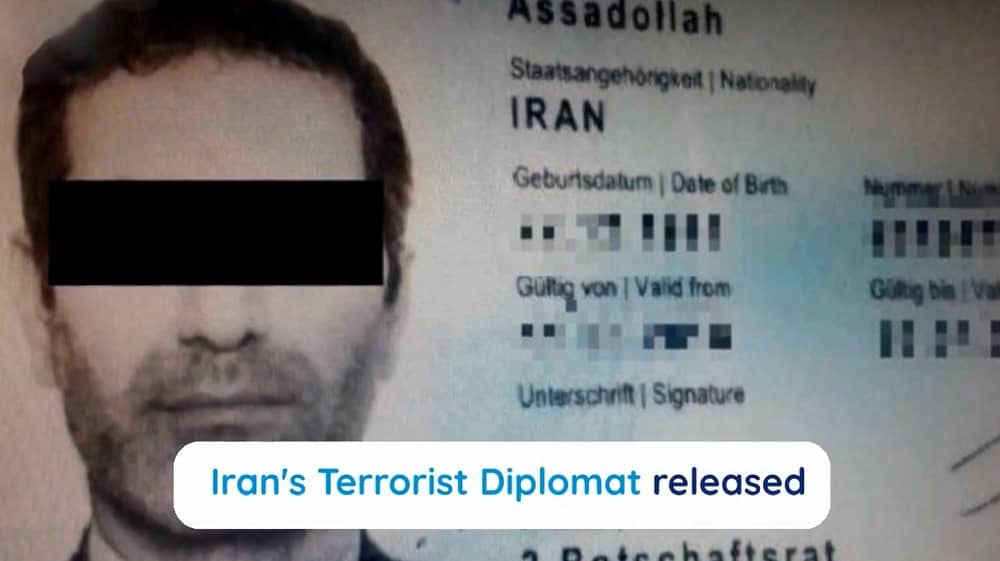
May 26, 2023: Belgium’s recent release of Iranian diplomat-terrorist Assadollah Assadi in a prisoner exchange has attracted strong criticism from experts, who perceive it as a manifestation of weakness on the part of both the European Union and the Belgian government.
In Brussels, Belgium, the Belgian government’s decision to set free Iranian diplomat-terrorist Assadollah Assadi through a prisoner swap has drawn sharp disapproval from domestic and international observers. Assadi had been convicted and sentenced to 20 years in prison for his involvement in a thwarted bomb plot aimed at an Iranian opposition rally in France, making his case highly contentious and high-profile.
Numerous experts express concerns that this action showcases the European Union and the Belgian government’s vulnerability, contending that they have effectively succumbed to the Iranian regime’s tactics of blackmail and negotiation. Critics argue that this move could potentially encourage further acts of terrorism while undermining the international community’s ability to deter and punish such actions.
The release of Assadi has been strongly condemned by the Iranian Resistance in a statement that criticizes the Belgian government for disregarding the Constitutional Court’s judgment, which stated that the victims should be informed before transferring the convicts to allow them an opportunity to seek justice once again.
The statement describes the release of the terrorist diplomat, who orchestrated and commanded one of the most significant criminal acts in Europe since World War II in violation of the court’s order, as a disgraceful act of giving in to terrorism and hostage-taking. It argues that this will embolden the ruling religious fascism in Iran to continue committing crimes through repression and regional and international terrorism, citing the alarming number of executions in Iran during the specified period.
Assadi, who held the position of third secretary at the Iranian embassy in Vienna, was arrested in Germany in July 2018 and later extradited to Belgium. He was tried and convicted for his role in the bomb plot, with the court finding evidence that he had provided explosives and a detonator to a Belgian-Iranian couple, instructing them to target the National Council of Resistance of Iran (NCRI) rally near Paris on June 30, 2018. European authorities successfully foiled the plot, preventing a potentially catastrophic terrorist attack.
The decision to release Assadi has raised doubts about the EU and Belgian government’s commitment to combating terrorism and ensuring accountability for those responsible. Critics argue that the prisoner swap conveys a message of weakness and might embolden other state-sponsored terrorists to carry out similar attacks, believing they can evade severe consequences.
Belgian officials have defended their decision in response to the criticism, claiming that the prisoner exchange was a necessary measure to secure the release of Belgian and European citizens detained in Iran on baseless charges. The government maintains that the swap was carried out in the interest of national security and the well-being of the detained citizens.
However, these justifications have done little to alleviate the concerns of critics who argue that this decision has broader implications for the global fight against terrorism and sets a perilous precedent. They assert that such an action undermines the rule of law and principles of justice that should be upheld regardless of the potential benefits derived from a prisoner exchange.
As the consequences of this controversial decision continue to unfold, it remains uncertain whether the Belgian government’s actions will have lasting effects on the EU’s approach to counterterrorism and upholding the rule of law.
The recent release of Assadi, combined with the ongoing human rights violations perpetrated by the Iranian regime, must not be dismissed or overlooked in the pursuit of improving relations or reaping economic advantages.
It is crucial for Western nations to unequivocally convey their intolerance for terrorism support and human rights abuses, ensuring that those responsible for such acts are held accountable for their actions.